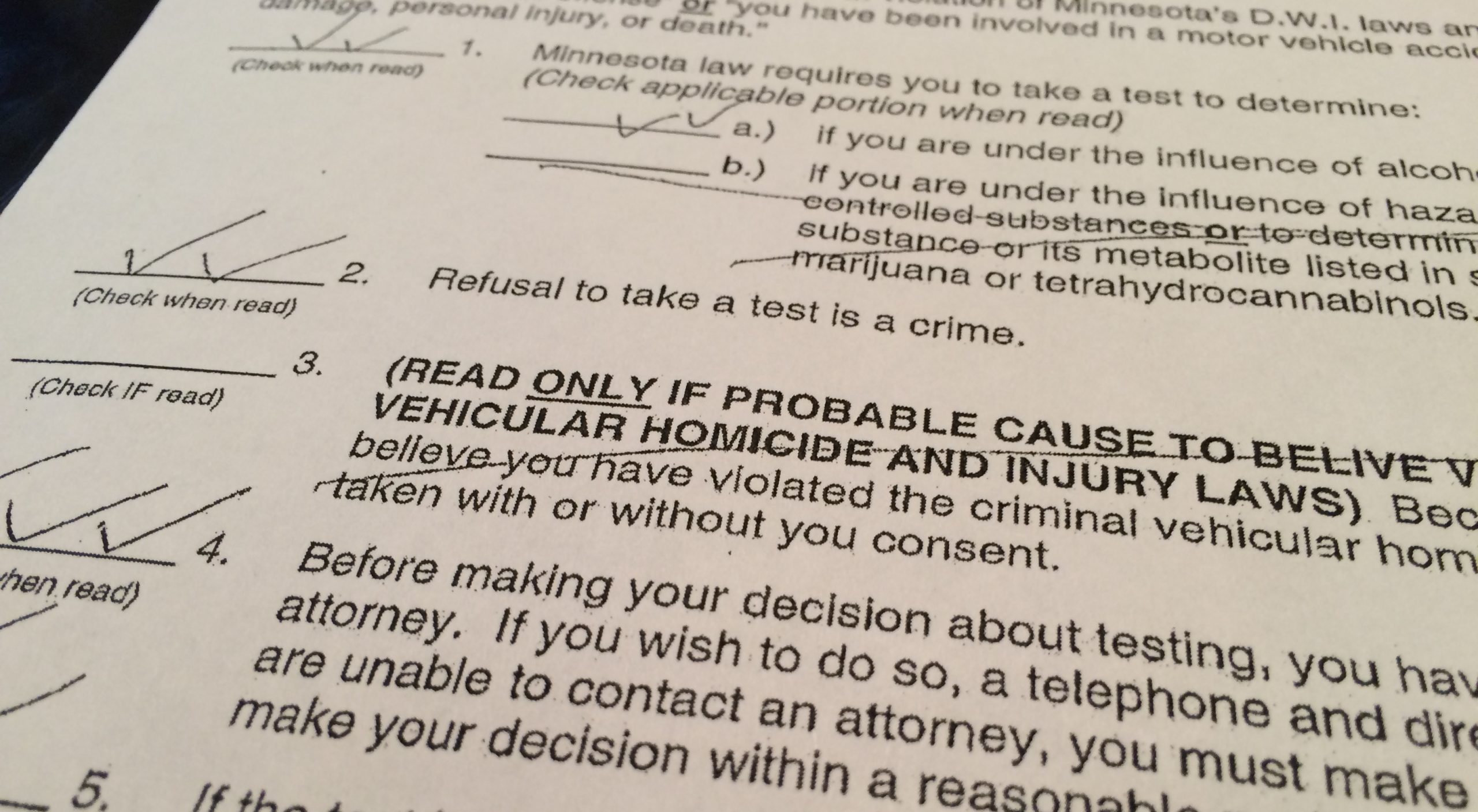
I Was Pulled Over & I Have Been Drinking – What do I Do? (Part 2)
Whether to take a test is like picking the lesser of two evils. Charged if you do, charged if you don’t.
To preface this post – I am ONLY TALKING ABOUT whether or not there is a way to avoid being CHARGED with a DWI AFTER BEING ARRESTED. I am NOT DISCUSSING whether or not a person will ULTIMATELY BE CONVICTED OF A DWI. These are TWO VERY DIFFERENT THINGS.
How to advise someone about whether or not to take the test has been a difficult question to answer for over a year now. The short answer is that there is no good answer to this question. Once, most attorneys advised people to take the test, then some weren’t willing to provide any advice, and some had a least thought about advising refusal. Of course, if you KNOW YOU ARE UNDER the legal limit, TAKE THE TEST. If you think you are going to have a high reading, there may be strategic advantages in refusing to take the test. Ultimately, IF YOU ARE OVER THE LEGAL LIMIT – YOU WILL BE CHARGED IF YOU DO and CHARGED IF YOU DON’T TAKE A TEST. Once a person is arrested for a DWI, the train does not stop with the police officers. Whether or not the stop, arrest, test, or any other actions were constitutional is something that is sorted out in court with your attorney. Not everyone who is charged with a DWI is convicted of a DWI.
Now, I am not advising anyone to commit a crime; I am providing information. DWI law and analysis has changed in the last year or so and will likely continue to change for some time. Currently, the Minnesota Supreme Court is deciding WHETHER THE CRIME OF REFUSAL IS UNCONSTITUTIONAL. The decision of whether to take the test or not results in different consequences.
Let’s start with THE BASICS:
If a person gets arrested for a suspected DWI he or she will be read Minnesota’s Implied Consent Advisory. This advisory is a form that an officer reads line by line that includes the language saying that 1) the officer believes that the person has been operating or in physical control of a motor vehicle while impaired; 2) that MINNESOTA LAW REQUIRES a person suspected of driving while impaired to take a test and; 3) that REFUSAL to take the test IS A CRIME. This may be read by the officer in the back of the squad car, at the jail, the hospital, or anywhere really.
The officer is required to tell the person that he or she will have an opportunity to contact an attorney before being asked to submit to a test and to give access to a phone and directory if a person chooses to contact an attorney. Finally, the officer will ask the person if he or she will submit to a breath, blood, or urine test. The officer has SOLE DISCRETION as to WHICH TEST he or she would like TO OFFER. Most of the time the officer will offer a breath test. IF the officer offers a BREATH TEST, REFUSAL to submit to the test is a CRIME; there is NO REQUIREMENT THAT THE OFFICER OFFER AN ALTERNATIVE TEST. The only option is to take the breath test or be charged with refusal. If the officer offers a BLOOD TEST, a person can refuse the blood test but will be charged with refusal if a urine or breath test is offered as an ALTERNATIVE and he or she refuses that as well. The same is true if an officer offers a URINE TEST first and then a blood or breath test second. For a first time DWI, a test reading UNDER 0.20 will result in a MISDEMEANOR charge and the person will LIKELY BE RELEASED and given a court date. If that first time DWI person REFUSES, he or she will be charged with a GROSS MISDEMEANOR and will be HELD IN JAIL until they appear before a judge or pay max bail. For a first time offense, refusal is a higher level of crime than a DWI.
So, this all seems pretty straight forward, why is this a difficult question to answer?
The catch is that the United States Supreme Court decided last year that, absent something other than a standard DWI stop and arrest, the police NEED A SEARCH WARRANT to test a person’s blood alcohol concentration. Minnesota courts dealt with this conundrum by finding that consent, or saying “Yes, I will take the test.” – EVEN IF A PERSON IS THREATENED WITH BEING CHARGED WITH A CRIME IF THEY DON’T SAY YES – it is VALID CONSENT and NOT COERCED – thus, negating the warrant requirement.
Now, a person can refuse to take a test. In doing so, when the police do not have a warrant, he or she is exercising his or her CONSTITUTIONAL RIGHT TO BE FREE FROM WARRANTLESS SEARCHES. But Minnesota CRIMINALIZES A PERSON’S EXERCISE OF THIS CONSTITUTIONAL RIGHT.
At this very moment, the Minnesota Supreme Court is deciding whether or not Minnesota’s Refusal Crime is Constitutional. For attorneys like myself, there is no question that the crime of refusal is unconstitutional and that Minnesota cannot criminalize the exercise of a constitutional right. Only in DWI law would this argument fly. However, it is unknown how the Court will decide. For now, YOU WILL BE CHARGED WITH A CRIME IF YOU REFUSE to submit to a chemical test to determine your blood alcohol concentration.